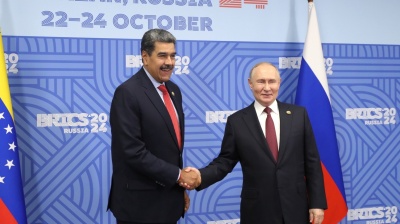A €1.77bn contract for the electrification of the Rail Baltica high-speed line was signed in Vilnius on September 15, progressing one of the largest infrastructure agreements in the region’s history, Rail Baltica said in a press release.
The Rail Baltica project will ultimately electrify 870 kilometres of railway and 2,403 km of tracks across Estonia, Latvia and Lithuania, making it the largest electrification programme in Europe. However, as reported by bne IntelliNews, the project has repeatedly been dogged by delays and rising costs, with cost estimates now reaching nearly €24bn.
The deal was awarded to COBELEC Rail Baltica, a consortium formed by Spanish firms Cobra Instalaciones y Servicios and Elecnor Servicios y Proyectos. It covers the full deployment of the project’s energy subsystem, with the first phase – worth €949mn – scheduled for completion by 2030. That is the date now officially set for Rail Baltica’s delivery, although the original target was set for 2026.
Catherine Trautmann, the EU coordinator for the North Sea–Baltic TEN-T Corridor, described the agreement as a milestone for European connectivity.
“Today’s signing of the electrification contract underscores the joint commitment of all project partners to build a unified and interoperable railway line across national borders. In the current geopolitical climate, strengthening the connection between the Baltic states and the rest of the European Union is more important than ever,” she said.
Marko Kivila, chief executive of RB Rail AS, the joint venture managing the scheme, stressed the long-term benefits.
“Electrification is not only about powering trains – it is about enabling sustainable mobility, ensuring interoperability with the European network, and securing long-term energy efficiency for the entire region,” he said.
News

Pashinyan urges end to ‘Soviet KGB worldview’ in Armenian-Azerbaijani relations
In an animated speech, Armenian Prime Minister Nikol Pashinyan called for a fundamental reset in the way Armenians and Azerbaijanis perceive one another, urging both nations to move beyond Cold War-era "KGB" mentalities are stil at play.

APEC meeting closes in South Korea, WTO dead and buried
This was not a summit. It was a eulogy for the WTO, and APEC just lowered the flag to half-mast.

Turkish state grabs another fintech as company seizures continue at pace
Turkey first seizes companies, then tries the suspects. Some companies are sold before the trial process.

Ukraine’s elite HUR forces turn the tide in the battle for Pokrovsk, as Russia’s effort to capture key logistics hub fails
The battle for Pokrovsk became intense early on November 1and it looked like the fall of the key logistics hub to Russia was imminent. But a bold counterattack by Ukraine’s elite HUR forces seems to have turned the tide.




